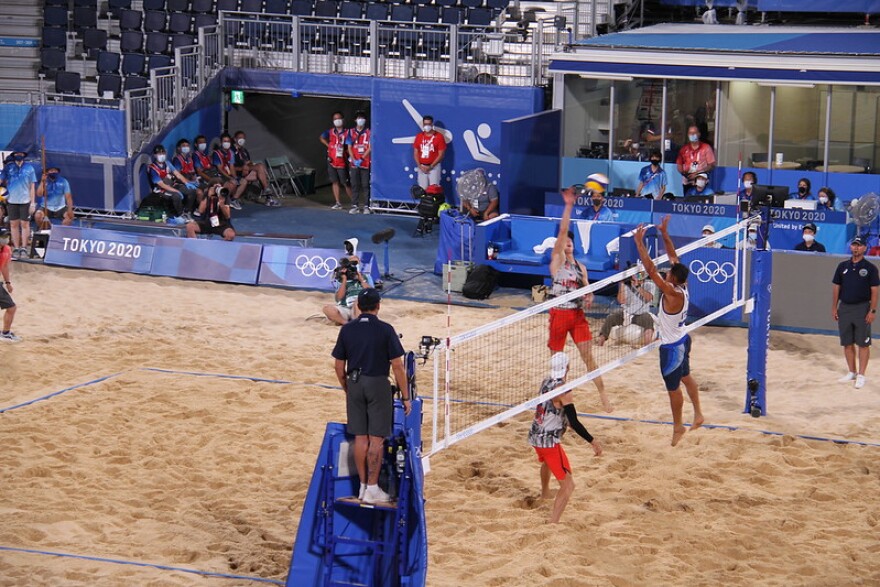Empty stadiums, athletes on TikTok, and some record-breaking — and triumphant — performances.
The Tokyo Summer Olympics were quite unprecedented. As athletes and journalists return to their home countries, KUER’s Caroline Ballard caught up with KSL reporter Shara Park as she headed to the airport to return home to Utah. Park recalled what it was like to cover the games under such unique circumstances.
This interview has been edited for length and clarity.
Caroline Ballard: Were these your first Olympics?
Shara Park: This was my first Olympics. It was interesting because I really didn't know what to expect and then add a pandemic on top of that. It was interesting because I really had no idea what I was getting into. But it was fun. It was hard work and I'm glad I did it.
CB: There were no crowds for these games and the only spectators at events tended to be coaches, other athletes and reporters. Can you describe what it was like to be there?
SP: Let me tell you about my experience being in the venue at beach volleyball. I was following Utah's Jake Gibb, he's our Bountiful beach volleyball player. At first I thought, ‘OK, well, we're going to go into the stadium and there's going to be, you know, the volunteers’ and things like that. But I could not believe when I walked into Shiokaze Park, which is the beach volleyball arena, just how empty it was. I mean, we were maybe a handful of press that were allowed to be in there. Everything was very regulated.
Sitting up in that stadium looking at completely empty stands was so shocking, and it was heartbreaking in some respects for those athletes because they were playing in front of these empty arenas and there's nobody in the stands. Yet, they're still putting it all out there on the court.
CB: Another big thing we saw was athletes using social media to let people inside the [Olympic] village. How did this help you as a reporter?
SP: It gave us some insight into what their lives were like, because at the normal Olympics we'd be able to talk to the athletes one on one. We'd be able to meet up with them. Because of [COVID-19] and the safety protocols, obviously we couldn't really get that interaction with them, so it helped in a way that it gave, honestly, some of these athletes a little more control over what they wanted people to see. I feel like it helped them relax a little bit. I feel like we got to see a more casual side of them, in a sense. But also it gave us a glimpse into the Olympic experience that they're having during a pandemic.
CB: There were around 30 athletes with Utah connections competing not just for the U.S., but for other countries as well. We have University of Utah gymnasts, resident climbers, Real Salt Lake and Utah Jazz players. How do you think they performed as a whole?
SP: I am so proud of our Utah athlete connections, every single one of them. It has been the highlight of my experience here in Tokyo, following each and every one of their journeys. The thing I look at and I take away from this is how well they represented Utah. They all put so much into each and every one of their sports and they were honestly just class acts.
Watching Joe Ingles [of the Utah Jazz] compete even though he didn't win the gold. I was so proud of him for the way that he led his team for Australia. Our climber, Nathaniel [Coleman], he did fantastic. You know, he came basically from the bottom of the pack up to win a silver medal. Jake Gibb, I mentioned him, he is so proud to be from Utah. It's those things that I look at, not just the performance on the court or in their respective sport, but the person and how proud they are to be connected to our state. And that is what I was cheering for here in Tokyo.
CB: Is there a moment you think will stay with you as a reporter and as a spectator?
SP: I think it's kind of what we touched on, the emptiness of the stadium. I have never seen something like that, where you go to the biggest event in the world and there's nobody there.
The other thing that will stay with me is the people of Japan and how they handled these games. Half of this country did not necessarily want the games to go forward with COVID still lingering, and yet they did it and they were so kind and so respectful and safety was top of mind every single place we went.
CB: Are you excited to be coming back home now?
SP: I'm so excited to go home. Three and a half weeks is a long time to be in a foreign country. I'm so glad that I got to do this, I really am, but I've got two little kids at home, my son William and my daughter Jane and my husband. For three and a half weeks they have been on their own, you know, and I miss them. So, yes, I'm excited to come home and be back with my family.


